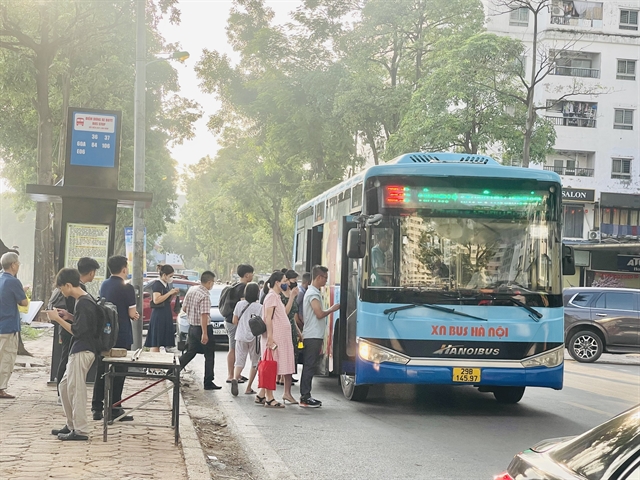 Society
Society


|
| A bus picks up passengers in Hà Nội. The roadmap to eliminate personal vehicles using fossil fuels, starting with banning gasoline-powered motorbikes within the Ring Road 1 from July 1, 2026, is a bold step in the urban traffic planning of the capital. — VNA/VNS Photo Tuyết Mai |
HÀ NỘI — Hà Nội has signalled its readiness to press ahead with its ambitious green transition, stating that the move away from petrol-powered vehicles will affect every resident, yet remains essential to tackle pollution and raise living standards.
This forms the core of the municipal People’s Committee’s response to voters’ petitions on the proposed roadmap to ban petrol and diesel motorbikes within the Ring Road 1.
Voters have requested that the city conduct detailed studies and assessments of the challenges and obstacles associated with banning petrol motorbikes, to ensure thorough planning and a suitable, transparent roadmap prior to implementation.
The committee noted that on July 12 this year, Prime Minister Phạm Minh Chính issued Directive 20/CT-TTg on urgent measures to decisively address environmental pollution.
Under the directive, the PM tasked the Hà Nội People’s Committee with “implementing measures so that by July 1 next year, no motorcycles or motorbikes using fossil fuels can circulate within the Ring Road 1. From January 1, 2028, no motorcycles, motorbikes, or restricted private cars using fossil fuels will be allowed to circulate within Ring Roads 1 and 2. And from 2030, continue to expand this within the Ring Road 3.”
On September 30 this year, the committee issued a plan to implement the directive.
It then assigned the municipal Department of Construction to propose policies offering incentives and support for citizens and businesses to shift to cleaner vehicles.
These policies include mechanisms to support businesses in developing infrastructure for the green transition, particularly in producing and assembling clean-energy vehicles, as well as investing in charging stations and battery-swap facilities.
They also set out roadmaps to encourage and assist residents in switching from fossil-fuel vehicles to clean-energy options or using public transportation.
Further measures include gradually increasing parking fees in central areas for fossil-fuel vehicles, with annual adjustments starting from October this year.
The plan also calls for a comprehensive roadmap to end the circulation of fossil-fuel vehicles and other pollution-causing vehicles in low-emission zones, alongside the development of a green transport system for Hà Nội that is feasible and minimises negative impacts on businesses and residents.
In addition, the city is studying mechanisms, plans and sanctions to support the development of green transport infrastructure.
The committee has tasked the Department of Construction and the Department of Natural Resources and Environment with promptly preparing draft resolutions for consideration by the municipal People’s Council, with submission expected by the end of this year.
The committee emphasised that the transition to green vehicles will profoundly impact all residents living and working in the city, and is a sensitive issue with diverse opinions; yet, it remains an indispensable requirement to reduce pollution, enhance quality of life, and meet sustainable development goals. — VNS




